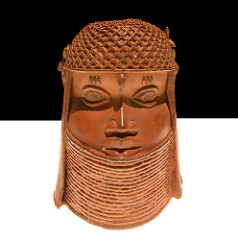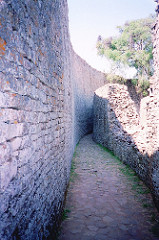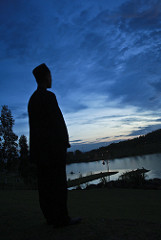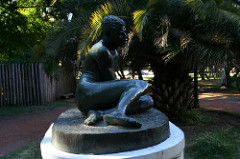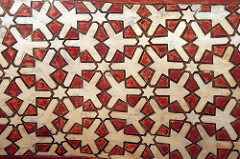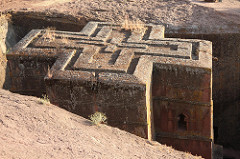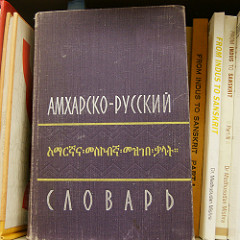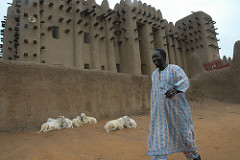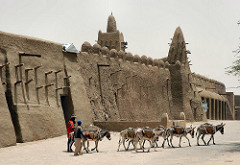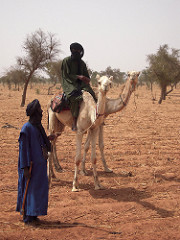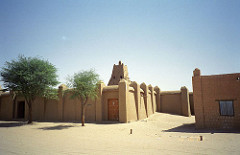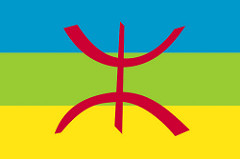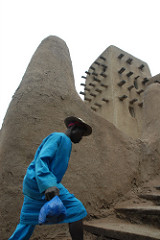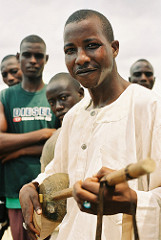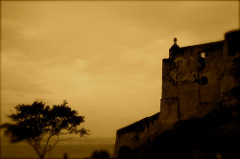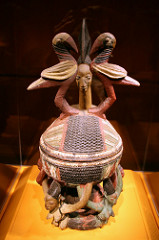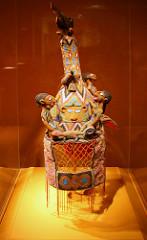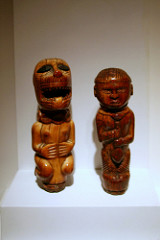Oba
title for the king of Benin
Great Zimbabwe
City, now in ruins (in the modern African country of Zimbabwe), whose many stone structures were built between about 1250 and 1450, when it was a trading center and the capital of a large state.
Maghrib
The Arabic word for western North Africa, the part of North Africa that is today the Mediterranean coast of Libya, Tunisia, Algeria, and Morocco
Bantu
a member of any of a large number of linguistically related peoples of Central and South Africa
Bantu Migration
the movement of the Bantu peoples southward throughout Africa, spreading their language and culture, from around 500 b.c. to around A.D 1000
Stateless Societies
African societies organized around kinship or other forms of obligation and lacking the concentration of political power and authority associated with states, sometimes more large and extensive than state societies.
Ifriqiya
The Arabic term for eastern north Africa and the , term used by the Romans for Africa. Also largely called Tunisa was ruled by Muslims between 640 and 700 CE.
Fez
Located in Morocco, the oldest continuous operating university in the world
Almoravids
The followers of the Great Puritanical Reformist Movement among the Islamic Berber tribes of northern Africa; rejected Sufism and were very violent (launched a series of jihads, or holy wars)
Almohadis
A reformist movement among the Islamic Berbers of northern Africa; later than the Almoravids; penetrated into sub-Sahara Africa.
King Lalibela
Ethiopian king and monarch of zagwe dynasty who directed a remarkable building project in which 11 great churches were sculpted from rock into the ground
Amharic
the dominant and official language of Ethiopia, was actually first used in the 13 and 14th centuries.
Ghana
First known kingdom in sub-Saharan West Africa between the sixth and thirteenth centuries C.E. Also the modern West African country once known as the Gold Coast.
Sahel
A strip of dry grasslands on the southern border of the Sahara; also known as "the shore of the desert" Was a point of exchange between the forests to the south and northern Africa
Umma
The community of all Muslims. A major innovation against the background of seventh-century Arabia, where traditionally kinship rather than faith had determined membership in a community.
Axum
Was a trading center and a powerful ancient kingdom in northern present-day Ethiopia. Had th language of Ge'ez
Sheba
African trading partner to Israel during Solomons reign and they were supposedly married; present-day Ethiopia
Ge'ez
An ancient Afro-Asiatic language of Axum; it is still used today as a ceremonial language in the Ethiopian Coptic Church (Christianity), one of the 1st written language in Africa
Takrur
Kingdom that was in northern Mali, declared it's independence from Mali, was located near the Senegal River at the same time Ghana was at the height of its power.
Gao
Prosperous capital city of the kingdom of Songhai, had caravan trade routes.
Ghana
First known kingdom in sub-Saharan West Africa between the sixth and thirteenth centuries C.E. Also the modern West African country once known as the Gold Coast. Islam was mainly used to reinforce the concept of kingship(A Royal Cult), and much of the population never converted.
Mali
Empire created by indigenous Muslims in western Sudan of West Africa from the thirteenth to fifteenth century. It was famous for its role in the trans-Saharan gold trade. Timbuktu, Sundiata, Griots, juula, Mansu Musa, (GOLD and lots of it) might also come to mind. Was after Ghana Empire but before Songhay Empire.
Juula
Malinke merchants; formed small partnerships to carry out trade throughout Mali empire; eventually spread throughout much of West Africa
Sundiata
The founder of Mali empire and the "Lion Prince" according to the griots. He crushed his enemies and won control of the gold trade routes., a leader whose exploits were the foundation of a great oral tradition. created unified state & basic rules for malinke society. Created "16 clans" and divided up the world.
Griots
Professional oral historians who served as keepers of traditions and advisors to kings within the Mali Empire
Ibn Batuta
Arab traveler who described African societies and cultures in his travel records, providing historians with much information about the Saharan trade
Mansa Musa
King of the Mali empire in West Africa from 1312 the 1337, is known mostly for his fabulous pilgrimage to Mecca and for his promotion of unity and prosperity within Mali, also brought the attention of Muslim world to Mali. Also constructed the Great Mosque of Jenne during his time.
Great Mosque of Jenne
Largest Muslim architecture in (Sub-Sahara), was constructed during the Mali King Mansu Musa's reign.
Timbuktu
City on the Niger River in the modern country of Mali. It was founded by the Tuareg as a seasonal camp sometime after 1000. As part of the Mali Empire, it became a major major terminus of the trans-Saharan trade and a center of Islamic learning. Has great Sanskore Mosque
Tuareg
Desert nomads who live in small groups throughout the central and south Sahara., Nicknamed "the Blue Men of the Desert"
Sankore Mosque
A mosque located in Timbuktu, that Mansa Sulayman founded a university in this building during the Malwi Empire which was (of course) that was used for prayer.
Songhay
Successor state to Mali; dominated middle reaches of Niger valley; formed as independent kingdom under a Berber dynasty; capital at Gao; reached imperial status under Sunni Ali
Berber
a cluster of related dialects that were once the major language of northern Africa west of Egypt, also an ethnic minority descended from and Arabs and living in northern Africa
Sunni Ali
Leader of Songhai that drove out the Berbers and built the largest empire in West Africa by his death in 1492, conquered Timbuktu and Djenne, which gave Songhai control of trade; focus on trading empire , was very ruthless even with fellow Muslims who got in his way. Line of leaders after him were called "askia"
Djenne
West African city that became a center of learning and culture, conquered by Mansa Musa. Known for it's libraries and universities. Also later by Songhay leader Sunni Ali.
askia
Ruler adopted name for the muslim leader of the Songhai Empire after the death of Sunni Ali. Best was Muhammad the Great.
Muhammad the Great
Extended the boundaries of Songhay to include Central Sudan so by the mid 16th century, Songhay dominated the area. a great Askia (songhay ruler)
Hausa
Peoples of northern Nigeria; formed states following the demise of Songhay empire that combined Muslim and pagan traditions. Largest City state at Kano.
Kano
The most prosperous Hausa city-state, 14 mile circumference; 30,000 people, best king was the Muslim Muhammad Rumfa ( Picture is of a Kano knot)
Manding Bory
Son of Maghan Kon Fatta and Namandje Kamara; half-brother and best friend of Sundiata; (aka Manding Bakary)
emir
A chieftain or prince/ commander or head of state in some Islamic countries. Name was used by the ruling families of some African States to enforce authority (along with Caliphate).
Sharia
the code of law derived from the Koran and from the teachings and example of Mohammed, was not followed to some extent in early sudanitic socities as anscestors were traced from the matrilineal line.
mirab
hole(niche) in wall, the direction of mecca
The Periplus of the Erythraean Sea
A 1st century account of the Indian Ocean, mentioned many port cities in Africa but was vague on inhabitants. Indicator of how far technology had developed at this point. Navigation and technologies at the time.
Zenj
Arabic term for the east African or Swahili coast. By the 13th Century, a string of urbanized trading ports had developed and were governed by separate Muslim ruling families. (Mombasa, Mogadishu, Kilwa, Pate etc etc).
Swahili
a Bantu language with Arabic words spoken along the East African coast (The official language of Kenya) and MY Ancestors.
Kilwa
A city-state found on east African coast(Zenj); fishing limited trade from 800-1000; turned to agriculture, increased trade in pottery and stoneware; major trading center by 14th century
Fort Jesus
Early 1600's barracks found in Mombassa( on the Zenj Coast). Was a Christian and Portugese thing, but then Omani sultans take it over in 1696. in the 1700's Portugese tried to recapture it, but failed.
Nok
West Africa's earliest known culture; lived in what is now Nigeria; between 500 B.C. and A.D. 200; first people known to smelt iron; fashioned iron into tools for farming and weapons for hunting
Yoruba
city-states that developed in northern Nigeria; Ile-Ife had an artistic style similar to that of the Nok culture. ag society supported by peasantry; dominated by an aristocracy
Ile-Ife
the capital of a kingdom with a lot of sculptures of the West African rain forest; seen as the birthplace of the Yoruba, holiest city; an agricultural society dominated by a ruling family and an aristocracy
Oduduwa
YORUBA (IFE) one of OLODUMARE's two sons, saw OBATALA sleeping and got the board mask and chicken and set it free on earth. it scratched up 16 mounds of dry ground and became the 16 kingdoms and the first one was the kingdom of IFE(YORUBA), CREATION MYTH WHATEVER PROBABLY doesn't matter
Kwa
a group of African language in the Niger-Congo group spoken from the Ivory Coast east to Nigeria
demography
the branch of sociology that studies the characteristics of human populations
demographic transition
The process of change in a society's population from a condition of high crude birth and death rates and low rate of natural increase to a condition of low crude birth and death rates, low rate of natural increase, and a higher total population. First observed in Western Europe and the United States in the 19th century.
Ogboni
A secret society of religious and political leaders that actually reviewed the decisions of the King and his council. Example of non absolute rule of kings in Africa in the postclassical period.
Edo
a member of a west African people living in the tropical forest region of southern Nigeria, founded Benin kingdom with Ewuare the Great
Benin
A powerful city-state formed around the 14th century; was not relatively influence by the Europeans despite coming into contact with the Portuguese'; important commercial and political entity until the 19th century( OBAS) Founded by Ewuare the Great
Ewuare the Great
Was the greatest warrior legend andand the most outstanding Oba in the history of the Benin Empire, "it is cool, or the trouble has ceased, and as a result the war is over." The title symbolizes an epoch of reconciliation, reconstruction and the return of peace among the warring factions in Benin between 1435-1440 AD
Kongo
Kingdom, based on agriculture, formed on lower Congo River by late 15th century; capital at Mbanza Kongo; ruled by hereditary monarchy.
Luba
modified the older system of village headmen to a form of divine kinship in which the ruler and his relatives were thought to have a special power that ensured fertility of people & crops in Katanga
Manikongo
The title given to the king of Kongo.
Monomotapa
Kingdom which stretched between Zambezi and Limpopo rivers of southern Africa, named that by Portuguese, dominance over gold found in interior of Africa, communicated with Arab port of Sofala on coast
Sofala
A seaport village in eastern Mozambique in the 1300s an important trading center for the gold miners of Great Zimbabwe
